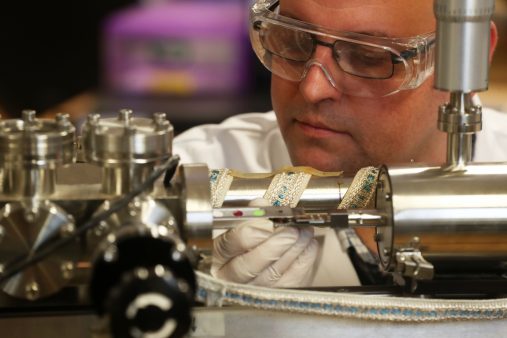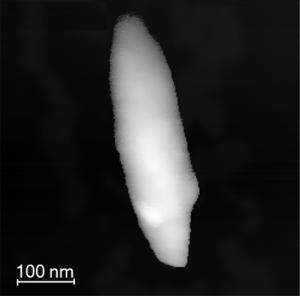Fighting disease with surface science
18 October 2021
Surface science is the study of how layers of atoms interact at the surface of materials. Experts from Cardiff Catalysis Institute (CCI) have recently been awarded funding that will enable them to apply their surface science expertise to molecular mechanisms that underpin important degenerative diseases – from osteoarthritis and glaucoma to psoriasis. Professor Philip Davies, from CCI, explains more.

“Surface Science is crucial in almost every aspect of technology. Every interaction of a material and its environment occurs at this level.
“We have an outstanding track record for surface science at Cardiff, but a new microscopy suite at our future Translational Research Hub (TRH), outlined in a recent Home of Innovation blog post, will allow us to do much more.
The suite will be home to an exciting new technique which provides simultaneous infrared spectroscopy and surface topography with nanoscale lateral resolution.
The Photo-induced Force Microscope (PiFM) was awarded to Cardiff through an Engineering and Physical Sciences Research Council (EPSRC) strategic equipment initiative.
Now, we are delighted to announce that the nano-vibrational spectroscopic capabilities of the CCI will be further enhanced by a closely related technique: “Tip Enhanced Raman Spectroscopy” or TERS.

TERS operates effectively in aqueous environments at a lateral resolution of < 10 nm and a height resolution of < 0.1 nm. It therefore offers a unique
opportunity to perform simultaneous nanoscale chemical imaging combined with topographical mapping to study biological macromolecules in their near native state.
This new instrument was awarded by the University’s RIF process to a team led by me, on behalf of CCI, and Dr Julie Albon (Cardiff University Optometry) with the aim of studying molecular mechanisms underlying important degenerative diseases such as osteoarthritis, glaucoma, and psoriasis that affect millions of people around the world.
The very diverse team also includes academics from Cardiff University’s Schools of Physics and Astronomy, Dentistry, Pharmacy and Pharmaceutical Sciences, and Biosciences, and so brings together a uniquely diverse skill set to tackle this challenge.
Cardiff is already an international centre for the study of surfaces. We have over 50 years’ expertise in many of the different experimental methods that have been developed and a particular specialisation in x-ray photoelectron spectroscopy (XPS).
In fact, Cardiff currently leads the UK’s Engineering and Physical Sciences Research Council (EPSRC) National Research Facility in photoelectron spectroscopy, HarwellXPS, which provides XPS expertise for the whole country.
Our long track record of excellence in surface science, the combination of awards for PiFM and TERS along with the other superb analytical instruments already available in the future TRH. creates a truly unique facility – and a truly exciting future – for surface and materials analysis.”
Philip Davies
Professor of Physical Chemistry, Cardiff Catalysis Institute.